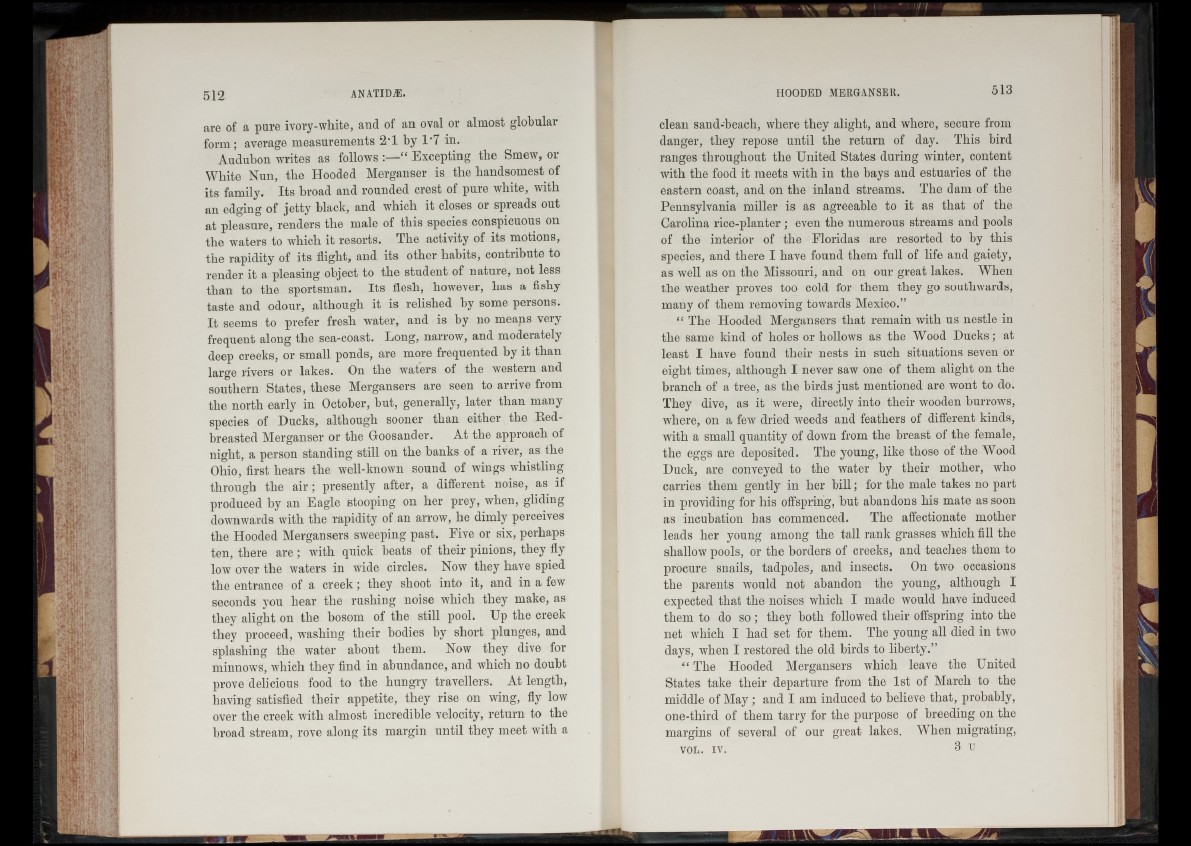
are of a pure ivory-white, and of an oval or almost globular
form ; average measurements 2-1 by D7 in.
Audubon writes as follows “ Excepting the Smew, or
White Nun, the Hooded Merganser is the handsomest of
its family. Its broad and rounded crest of pure white, with
an edging of jetty black, and which it closes or spreads out
at pleasure, renders the male of this species conspicuous on
the waters to which it resorts. The activity of its motions,
the rapidity of its flight, and its other habits, contribute to
render it a pleasing object to the student of nature, not less
than to the sportsman. Its flesh, however, has a fishy
taste and odour, although it is relished by some persons.
It seems to prefer fresh water, and is by no means very
frequent along the sea-coast. Long, narrow, and moderately
deep creeks, or small ponds, are more frequented by it than
large rivers or lakes. On the waters of the western and
southern States, these Mergansers are seen to arrive from
the north early in October, but, generally, later than many
species of Ducks, although sooner than either the Redbreasted
Merganser or the Goosander. At the approach of
night, a person standing still on the banks of a river, as the
Ohio, first hears the well-known sound of wings whistling
through the air ; presently after, a different noise, as if
produced by an Eagle stooping on her prey, when, gliding
downwards with the rapidity of an arrow, he dimly perceives
the Hooded Mergansers sweeping past. Five or six, perhaps
ten, there are ; with quick beats of their pinions, they fly
low over the waters in wide circles. Now they have spied
the entrance of a creek ; they shoot into it, and in a few
seconds you hear the rushing noise which they make, as
they alight on the bosom of the still pool. Up the creek
they proceed, washing their bodies by short plunges, and
splashing the water about them. Now they dive for
minnows, which they find in abundance, and which no doubt
prove delicious food to the hungry travellers. At length,
having satisfied their appetite, they rise on wing, fly low
over the creek with almost incredible velocity, return to the
broad stream, rove along its margin until they meet with a
clean sand-beacli, where they alight, and where, secure from
danger, they repose until the return of day. This bird
ranges throughout the United States during winter, content
with the food it meets with in the bays and estuaries of the
eastern coast, and on the inland streams. The dam of the
Pennsylvania miller is as agreeable to it as that of the
Carolina rice-planter ; even the numerous streams and pools
of the interior of the Floridas are resorted to by this
species, and there I have found them full of life and gaiety,
as well as on the Missouri, and on our great lakes. When
the weather proves too cold for them they go southwards,
many of them removing towards Mexico.”
“ The Hooded Mergansers that remain with us nestle in
the same kind of holes or hollows as the Wood Ducks; at
least I have found their nests in such situations seven or
eight times, although I never saw one of them alight on the
branch of a tree, as the birds just mentioned are wont to do.
They dive, as it were, directly into their wooden burrows,
where, on a few dried weeds and feathers of different kinds,
with a small quantity of down from the breast of the female,
the eggs are deposited. The young, like those of the Wood
Duck, are conveyed to the water by their mother, who
carries them gently in her bill ; for the male takes no part
in providing for his offspring, but abandons his mate as soon
as incubation has commenced. The affectionate mother
leads her young among the tall rank grasses which fill the
shallow pools, or the borders of creeks, and teaches them to
procure snails, tadpoles, and insects. On two occasions
the parents would not abandon the young, although I
expected that the noises which I made would have induced
them to do so ; they both followed their offspring into the
net which I had set for them. The young all died in two
days, when I restored the old birds to liberty.”
“ The Hooded Mergansers which leave the United
States take their departure from the 1st of March to the
middle of May ; and I am induced to believe that, probably,
one-third of them tarry for the purpose of breeding on the
margins of several of our great lakes. When migrating,
VOL. IV. ^ U